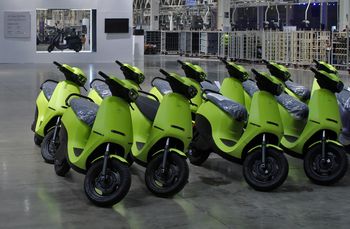India’s EV (electric vehicle) sector is witnessing substantial growth, positioning the nation as a major global market for electric vehicles (EVs) by 2030. Ten years ago, electric vehicles were perceived as an overly ambitious idea with slim prospects compared with conventional vehicles. However, in 2023, and now into 2024, they have emerged as one of the most rapidly expanding segments in India’s automotive industry. Supported by a range of government initiatives and private-sector-led transformative and sustainable business models, EV adoption has witnessed notable surges and the demand for economical and eco-friendly transport is expected to skyrocket in coming years.
Transformation of India’s automotive sectors is key; it contributes seven per cent to its GDP, 35 per cent to manufacturing GDP and over eight per cent (or $35 billion) to total exports. India has the third-largest global auto market, is the largest producer of three-wheelers, the second-largest manufacturer of two-wheelers and buses and the fourth largest of passenger cars. India is also making remarkable strides in the export of EVs; the EV export market grew 246 per cent in the first seven months of 2023. These remarkable statistics form the bedrock of India’s electric mobility revolution and the time has come to capitalise on this sunrise sector.
India must replicate the success of its ICE (internal combustion engine) industry in the electric vehicle ecosystem. India’s strategy with EVs in the 21st century should draw parallels with Japan’s strategy with ICE vehicles in the 20th century. By developing its EV market, India should mirror Japan’s historical success in breaking into global markets with strong domestic demand and significant export potential. Specific component-level manufacturing, battery production, and a holistic approach to the value chain, including charging infrastructure and recycling, are critical elements for achieving this.
Electrification of two and three-wheelers has been a remarkable achievement, but achieving 100 per cent electrification by 2030 is critical to becoming the world’s automobile champion. A similar trajectory for electric buses is pivotal in further greening and expanding India’s public transport networks, as India will see more than 500 million citizens getting into the process of urbanisation in the next few decades. Addressing road transport emissions is key; it accounts for 11 per cent of India’s energy-related CO2 emissions and this share is expected to significantly increase as India develops and urbanises. To meet its 2030 target for EVs, India needs to adopt millions of EVs, demanding battery capacities in hundreds of Gwh.
Original equipment manufacturers (OEM) and battery manufacturers should swiftly expand production and establish new battery manufacturing centres, recognising that batteries constitute around 40 per cent of EV costs. Conventional OEMs should align with swiftly changing customer and market preferences through technological advancements to maintain competitiveness. Embracing a collaborative ecosystem is essential for a thriving market amidst this current tide of the EV revolution, and Indian companies have carried themselves positively in these waves of change. Collaborative innovation between electricity producers, energy storage providers, recyclers of critical components and EV manufacturers is extremely pivotal to building a sustainable, reliable and cost-effective EV ecosystem in India.
India’s EV sector is observing a significant number of collaborations, partnerships, merger and acquisition transactions, the rise of promising start-ups, and the unveiling of substantial projects by automotive giants. The EV industry is also drawing significant FDI. VinFast, a Vietnamese EV giant, recently unveiled a $2 billion project in Tamil Nadu.
This is the right time to enable a transformational revolution in India’s automotive sector and accelerating adoption of EVs sits at the heart of this revolution. This strategic move not only aligns with global trends but also presents a unique opportunity for India to shape the future of mobility for itself and the world. India can position itself as a trailblazer in sustainable transport. This not only addresses environmental concerns but also contributes significantly to economic growth and global competitiveness. As the automotive landscape evolves, the acceleration of EV adoption emerges as the catalyst that propels India into a future where innovation, sustainability, and economic prosperity converge in a harmonious and sustainable automotive ecosystem.
Author is G20 Sherpa. He is ex-CEO, NITI Aayog.


